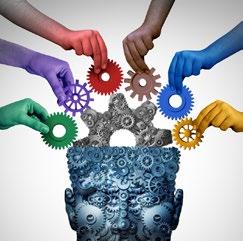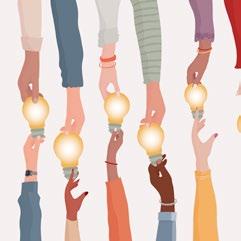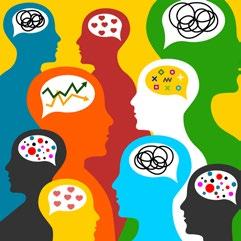
3 minute read
How to Become a Diversity, Equity & Inclusion Specialist
from EOEJournal MAY 2023
by EOE JOURNAL

Now more than ever, top-tier employees and applicants are looking for a holistic work environment. Competitive pay, benefits, and growth opportunities remain crucial to attracting the best talent, but those traditional asks are now partnered with a desire for assured equitable circumstances, diverse environments, and confirmed inclusion opportunities for all employees.
Diversity, equity, and inclusion specialists make it their mission to ensure that an organization’s people are being treated fairly, with respect, and are aware of the opportunities available to them.
Diversity, equity, and inclusion specialists work closely with the human resources team, and often a director or manager of diversity and inclusion. They are a supportive member of the larger HR family, focusing on an organization’s overall diversity, equity, and inclusion strategies, programs, advancements, and retention.
They are subject matter experts in the fields of diversity, equity, and inclusion, and are trusted to bring creativity and compassion to the department.
Diversity, equity, and inclusion specialists are excellent communicators with a passion for justice in the workplace. They are often people with a talent for speaking, collaborating, and understanding the diverse backgrounds of others. They carry a high level of respect for global cultures and differences and are excited by team-building opportunities.
Day-to-day duties for a diversity, equity, and inclusion specialist can vary based on the industry you work in and the size of the department and company. However, the main goal of a diversity, equity, and inclusion specialist stays consistent –– ensure equity in your organization. This can be done through managing diversity programs, projects, trainings, and communication logistics, cross-divisionally.
Across various industries, typical job functions for diversity, equity, and inclusion specialists include:
Event and programming organization.
Diversity presentations and trainings are often presented to multiple divisions and departments at once, through engaging events or experiential programs. Specialists are likely to organize, facilitate, and moderate an organization’s events.


Committee Support.
Many organizations host committees that allow specific groups of employees, or those with a shared connection, to connect and evaluate their needs from the organization. These groups could be a Women in the Profession Committee or an LGBTQIA+ Alliance. The specialist supports these committees by ensuring they have the proper resources and helps them to plan and meet their objectives.

Employee communication.
Diversity, equity, and inclusion specialists are responsible for answering employee questions via email, phone, or in person. Employees may have questions about the organization’s progress on a specific issue or need help understanding the equity resources available to them. A specialist may also be the first point of contact when an employee brings a diversityrelated concern to the HR department.
Think big, do good and help create a clean energy future!
At the New York Power Authority (NYPA), we work for the greater good and a stronger, sustainable New York.

Come join our team of almost 2,000 collaborative, purpose-driven professionals who are creating the clean energy system of the future.

Together, we can lead the transition to a carbon-free, economically vibrant New York through customer partnerships, innovative energy solutions, and the responsible supply of affordable, clean and reliable electricity.
Manage data & analyze reports.
Diversity, equity, and inclusion specialists will likely write and distribute diversity, equity, and inclusion surveys, requests, and questionnaires. They will then compile the data from those resources and analyze it to deliver reports to their superiors in the HR department, and possibly C-suite stakeholders.
Do I Need a Certification For This Position?
Diversity, equity, and inclusion certifications can vary by industry and employers but are likely not a requirement for those applying for a specialist role. Programs like the Society of Human Resource Management’s Inclusive Workplace Culture Specialty may help set you apart from other candidates when submitting applications.
How Do I Become a Diversity, Equity, and Inclusion Specialist?
Diversity, equity, and inclusion specialists typically hold a bachelor’s degree in a human resources-related field. A bachelor of science business administration in human resource management, for example, encompasses coursework like business management, accounting, psychology, industrial relations, and more. This degree ensures you have the business understanding to enter an HR department with confidence, and allows room for study in the specific knowledge area you’d like to specialize in. For those looking to enter the diversity and inclusion space, there are capstone and program opportunities that focus specifically on those trainings.
Most diversity, equity, and inclusion specialists hold a bachelor’s degree. Those looking to advance further into a position like a VP of Human Resources or a Director of Diversity and Inclusion may benefit from an advanced degree. A BSBA in HRM is the best place to start, giving you the foundational knowledge you need before exploring diversity, equity, and inclusion roles.
What Skills Does a Diversity, Equity, and Inclusion Specialist Need?
If you are interested in pursuing a diversity, equity, and inclusion position, it is beneficial to have a balance of hard and soft skills. Typical skills include:
• Passion for justice, equity, diversity, and inclusion work
• Excellent communication skills
• Respect for compliance and confidentiality
• Creativity and curiosity, with a solutions-based mentality
• Detail-oriented when ensuring compliance
• Ability to assess data and make recommendations
• Strong organizational skills
How Much Does a Diversity, Equity, and Inclusion Specialist Make?
As of February 2022, diversity, equity, and inclusion specialists made an average of $71,906 per year, according to ZipRecruiter. This ranks higher than other entry-level HR specialist roles, likely due to the need for this developing position and the specialized training involved. The typical pay for this role can vary by city and industry, but the range starts around $60,000 to $80,000, on average.










